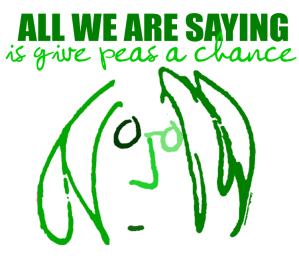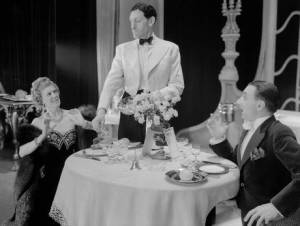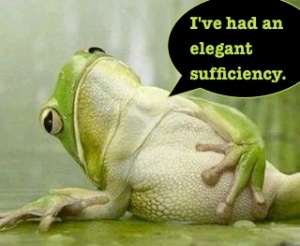After moving into the Castle, I discovered that I didn’t know how to eat in English, in public. My first attempts were in restaurants. I don’t remember the whole text of the Declaration of Independence, but I’m pretty sure there was something in there about our inalienable GodBlessAmerican right to life, liberty, and the pursuit of iced beverages with free refills. But in England I’ve learned that if you order a drink with ice, it will arrive with a brave little ice chip bobbing forlornly. So I usually request a drink with twenty-three ice cubes, and hope the wait staff didn’t spit into too many of them.
In America, menus are regarded as mere culinary suggestions which can be modified to suit each customer’s whim. But here in England, menus are basically chiseled onto stone tablets. No substitutions. Jack Nicholson would not approve, but I’ve grown to like this approach. It’s fast, clean, and takes all the guesswork out of ordering. .
Also, here you need to be grateful for any scrap of your waiter’s attention. They are not here to serve you; because that would imply that they are servants. Instead, they are people who happen to stop by your table with food now and then, and as such they deserve your (pathetic) gratitude for imposing on their valuable time. I’ve gotten so used to apologizing for every request that even when I got a steak that smelled like week old road kill, I hesitated to mention it to the waiter. When I couldn’t stand the smell, I still waited to catch his eye before starting to apologize. “I’m so sorry, but I wonder if you might have brought the wrong steak? This one seems like it isn’t what I was looking for. Perhaps you could just bring me a piece of fruit if it’s not too much trouble?”
Oh, and I’m an American, so I tip. After intensive therapy, I’m slowly working my way down from twenty percent to fifteen.
For the first year or so that we lived in England, my neighbors were too polite to comment on my American table manners.
They got over it.
 At Harvest Supper in the Village Hall last year, I noticed the man to my right was practicing the British art of Pretending Not to Look as I cut my meat, put down my knife, transferred my fork to the right hand, and proceeded to eat the piece I’d just cut. Cut/switch/repeat. Meanwhile I watched in open admiration as his wife turned her fork upside down so that something shaped like a shovel turned into a slide. She speared three peas on the tines, and using the impaled peas as anchors, balanced a few more on the upside down tines, and maneuvered it all to her mouth—still upside down. Eating five peas at a time without losing a single one was an incredible feat of balance and persistence. I didn’t know whether to applaud or never attempt public pea consumption again.
At Harvest Supper in the Village Hall last year, I noticed the man to my right was practicing the British art of Pretending Not to Look as I cut my meat, put down my knife, transferred my fork to the right hand, and proceeded to eat the piece I’d just cut. Cut/switch/repeat. Meanwhile I watched in open admiration as his wife turned her fork upside down so that something shaped like a shovel turned into a slide. She speared three peas on the tines, and using the impaled peas as anchors, balanced a few more on the upside down tines, and maneuvered it all to her mouth—still upside down. Eating five peas at a time without losing a single one was an incredible feat of balance and persistence. I didn’t know whether to applaud or never attempt public pea consumption again.
“Look at that American plate.” One lady across the table murmured to another.
I looked down. My plate was white china, just like their plates. Of course, you couldn’t see some of it since my dinner came with mushy peas that I didn’t eat because I’m a grownup American who doesn’t consume food that’s a sculptural medium. (Unless it’s mashed potatoes, of course.) And there was an entire serving of blood pudding on my plate because you know — blood pudding. But my knife and fork were properly placed at 4:20 on the plate circle.
I looked around the table. My neighbors were British, which meant they would all be serious contenders if there was ever an Olympic event for Pretending Not to Look. But I’ve potty-trained four children. I know about waiting. Finally a few looked over nervously. I pointed to my knife and fork. They shook their heads slightly. “Knife and fork at six o’clock if you’re finished eating,” one whispered. “Unless you’d like more…”
“No, thanks, I’m stuffed.” I tried a smile. They winced.
A neighbor turned to me. “My grandmother taught us what to say.” She looked me straight in the eye. “I’ve had an elegant sufficiency.”
So there it is. I’m learning not to cut/switch my knife, to tip less, and to put my knife and fork at six o’clock on my plate. But there’s still so much more I don’t know about eating in England. So I guess I’ll have to hang around. At least until I’ve had an elegant sufficiency.




Seems like too much work for me. Can’t I just use my fingers?
I have heard that the food across the pond is not all that. Unless you like Indian food and curry which is supposed to be terrific.
LikeLike
I think that a lot of English play down the food the same way they do everything except dogs and golf. But actually, there are some very good restaurants. Just yesterday we went to the Magpie Cafe in Whitby , where the fish and chips would make you cry.
LikeLike
One of my fav plates!
LikeLike
“Elegant suffieciency”, sounds like something my mother would have said, along with, “More affordable,” and, “Mow the lawn.” I love that animation of the dogs dining…just too cute 🙂
LikeLike
Of course the depressing part is that the dogs have better table manners than I do.
LikeLike
I have had British people come and visit us and felt like a complete dolt while eating with them. It made me either want to fast (fat chance… I love to eat way too much), or take lessons in eating manners. You helped in the lessons today, thanks!
LikeLike
The really wonderful thing about the English (at least the wonderful ones in my village) is that they have such beautiful manners. They will wait until they have known you for several years before even trying to give you hints about your own manners. Although their opinion does slip out now and then. At Village Coffee, a neighbor was worried about her grandchildren’s lack of proper training. “They eat like wild animals or Americans…”
LikeLike
this is so funny, barb )
LikeLike
Thanks! If you come visit, I promise to be on my best behavior. I might even import some extra letter “U”s and make it behaviour.
LikeLike
perfect. and i imagine it would be a colourful adventure )
LikeLike
Oh gosh I should have read this earlier. Well, at least you didn’t belch at the nice English people. My mom was so into proper etiquette–I still hear her at times and tend to swear at her (she’s been gone a long time). You are better than me. I would ask why they were gazing into my plate. I love the clip with dogs. I’m getting old. The things that thrill me these days… Now, if I can just get my grown children to place their service ware into the plate when finished and not resting on the sides…no matter what clock position (6 o’clock-really? 😀 ). I guess they will hear me years from now. Barb, thanks for the laugh! 🙂
LikeLike
Six o’clock. I swear.
It’s a universal “I’m done” signal. But god forbid you should leave any food on your plate, you American wastrel. They don’t do doggie bags, even if you have an actual doggie.
LikeLike
Me thinks I will not fit in because I do not conform easily. Oh well. 🙂
LikeLike
As I told Racheve, I don’t see it as conforming, but rather as being polite. I’ll never have the accent, “Cheerio” will be a breakfast food, and I’ll wear my pants over panties instead of knickers under trousers. They love Americans in our village, so I’m positive you’d fit beautifully (unless you cheer for Uruguay in the World Cup…).
LikeLike
Aw I am a little sad that you feel anything needs to change!! You are American and therefore not English, I would definitely be curious about any different table manners if i witnessed them but I certainly wouldn’t expect you to change them regardless of how long you had been here, however I would anticipate you would naturally pick some up 🙂
LikeLike
I don’t think of it as needing to change. It’s more like if I went to live in China, I’d make a sincere effort to eat elegantly with chopsticks in the Chinese (and not Japanese) fashion. Believe me, every single person in this village sees me as the American. In fact, it makes me a little more “Hey, you guys!” than I would normally be. But I know what you mean about picking things up. After we’d lived in Virginia for a few years, we didn’t even hear ourselves say y’all. (Don’t think I’ll ever pick up mushy peas or blood pudding though…)
LikeLike
I would starve to death or spend a lot of time in solitary I’m afraid.
LikeLike
Ah, but you’re forgetting those three little words that make it all worthwhile: fish and chips. MUCH better than solitary starvation!
LikeLike
You’re right. Yummm
LikeLike
Lovely post…I must admit that the European habit of no drink refills and ice allergy is interesting. The Italians though wouldn’t appreciate the quantity of ice in the average American drink they’d figure that someone was trying to con them giving them water rather than say, a coke. Here 4:30 means…I’m finished, if you’re not finished you put your knife and fork leaning off the side of your plate. I’d already learned how to cut and eat my food without the change over when I was a teenager…I was in love with George Harrison and felt I had to learn to eat like the English did…turned out to be handy when I came to Italy, though UNLESS we’re talking about eating meat and veggies together, one eats with their right hand. Blood Pudding sounds really yuckky!
LikeLike
Ah, you’re making me nostalgic again, Barb. Went across the pond for a visit when I was seventeen and my nineteen year old cousin took me to an ‘American restaurant’ where we ordered a hamburger and fries. I ate everything with my hands. Never gave it a second thought. He ate the whole thing, burger included, with a knife and fork.
I made fun of him, of course. Best defense is offense.
But I do know how to use a knife and fork and I am aware of the six o’clock position. And when I am in England I follow their customs. But when they come to Canada, they still use a knife and fork. So very rude, in their own polite, but stubborn, way.
LikeLike
Pingback: Why I Love Search Engine Fails | Barb Taub